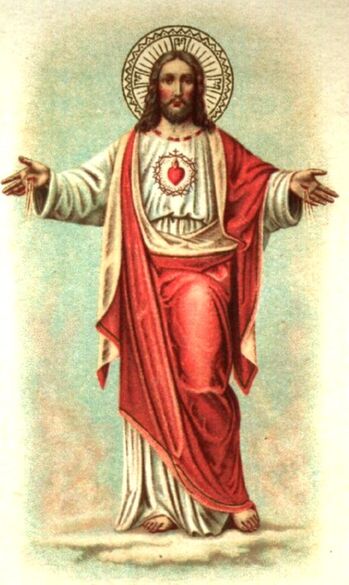
First Point.—-By instituting the feast of the Sacred Heart, the Church has wished to honor the immense love with which the heart of God has burned for us, and to eternalize the memory of it. In fact, the heart is the seat of the affections and the principle of generous devotion. To establish a feast in honor of the heart of Jesus is, therefore, to erect a monument which shall recall the sacrifices which the love of Jesus for men has imposed on Him. And what is more natural than such an institution? To console herself for the loss of her cherished child, a mother retains a part of his clothing. A child, to solace his sorrow, erects a suitable monument to the memory of the mother whom he has lost; a people set free from slavery wish to preserve the generous heart of the liberator whom death has removed from their gratitude; in fact, it seems that while these precious pledges keep their regrets alive, they still sweeten their bitterness.
The feast of the Sacred Heart is a monument which must constantly recall the love and the blessings of our divine Saviour. In the Eucharist we adore not only His divine nature, but also His body and blood; by a particular feast we venerate His adorable wounds and the very thorns with which His sacred brow was crowned, the nails which pierced His hands and feet, and the cross on which He expired. How then shall we refuse our homages to this Sacred Heart, the noblest and tenderest portion of His sacred humanity? All blessings have come to us from this divine Heart. By the mouth of Jesus it has published those evangelical truths which teach us the way to heaven. It was the heart of Jesus that wept over Lazarus in the tomb, and over the ill-fated city of Jerusalem—sad figures of a soul stained by sin. It was His heart which prompted Him to heal the sick and call the children to Him, and to pardon sinners and raise the dead to life. It was His heart which poured out its bloody sweat from every part of His body in the Garden of Olives. If it is true that one deserves to be loved in proportion as they love, what love does not our adorable Saviour merit? Open the Gospel and judge of it for yourself. How amiable He is when He compares Himself to a Father who weeps for very joy at seeing His prodigal son return; when He depicts Himself to us under the image of the Good Shepherd who seeks for His lost sheep; when He pardons the woman taken in the commission of sin, and when He allows the vilest sinners to approach Him. Whom do you see at His feet? Magdalene, a public sinner. And on whom does He bestow His tenderness and mildness? On the poor children whom He caresses. He meets with a widow who mourns the loss of her only son, and His heart is touched with pity and He commands death to give back its victim. Behold Him at Jacob's well, conversing with the Samaritan woman and revealing to her the secret of His divinity. Is it possible to manifest more merciful tenderness? But behold the masterpiece of His love ! Before the Good Shepherd had given His life for His flock, He had given them His heart, by instituting the Blessed Eucharist. Other shepherds provide food for themselves from their flock, but Jesus gives Himself to His sheep to be their nourishment: "Eat, this is My body, drink, this is My blood." And He shall remain with them till the end of time to sustain and console them. " Come to Me, all you who are heavily laden, all you that suffer, come to Me whosoever you may be, and I shall refresh you." Where shall you find love more constant, words that are sweeter, or invitation more pressing? You are worthy of pity if these thoughts do not reach your heart.
Second Point.—To suitably honor the heart of Jesus, three conditions are necessary: We should invoke it with confidence, imitate it with fidelity, and love it generously. Invoke it with confidence. It is the heart of a friend, and you could not doubt it for a moment, especially after reflecting on what has just been told you. You shall seek in vain to find a heart that loves you with more devotion. But besides, it is the heart of a God. You may doubt the constancy of some mortal friend and you may suspect his fidelity; you may exhaust his kindness, for every human love is inconstant and all human goodness has limits; but the heart of a God! ah, no. When human friendship fails, His friendship shall never fail and is the only one worth striving for. How often does mistrust and suspicion invade our hearts and wound the Sacred Heart of Jesus! We think that we shall never acquire piety, or overcome certain defects, or conquer certain temptations; we think, therefore, that Jesus does not love us sufficiently to help us, or that He is not powerful enough to defend us against the demon! Be on your guard against such despairing thoughts. They are one of the most dangerous temptations, especially in certain circumstances, when a great confidence can alone give us the strength to overcome every obstacle. You should imitate the heart of Jesus if you wish to honor it worthily. To imitate the heart of Jesus is to copy it. Now, when you wish to copy a picture, you must first study it. To copy the heart of Jesus, the first thing to do is to strive to know it well. The god of philosophers is known by the prodigies and wonders which come from his hands, but the God of the humble Christian is known especially by His blessings.
The dove selects the rocks of the deserts in which to build her dwelling, but the faithful soul chooses the heart of Jesus, in which she retires and there reflects in secret. In the heart of Jesus she beholds her own; she contrasts the thoughts, the affections, and the desires of Jesus with her own desires, affections, and thoughts. In the heart of Jesus she finds humility, chastity, charity, patience, love of the cross, and zeal for souls; but in her own heart she finds pride, sensuality, jealousy, love of pleasures, and inconstancy; she strives to dispel all these vicious dispositions and exemplify the virtues of her divine Model. Jesus smiles on her efforts, and sustains them by His grace. You should love the heart of Jesus. The only request which Jesus makes, the only gift that He would receive from us, is the possession of our heart. "My son," He says to you, "give Me thy heart." And here let us ask, what is our heart, that Jesus asks for it so earnestly? What treasure is concealed there? It is because the most precious of all gifts is the heart, and it renders every other gift precious. But is it not something more ? Yes, since to possess the heart is the glorious triumph. Everywhere the victory for Jesus was easy. He walked on the waters, He healed the sick, He commanded the elements; in a word, nothing could resist His power. It was only in the heart He found resistance, and now He considers it His glory to conquer it. Thus, all His efforts tend to gain the hearts of men. In the crib, His tears; on the cross, His sufferings; in the Eucharist, His humiliations—everything to win human hearts to Himself.
Christian, God asks your love, shall you dare to refuse it to Him? It is absolutely necessary that your heart should be given to some one, since it cannot live without loving, nor can it love without bestowing itself on the object of its love. If your heart is to be given or sold, who can better purchase it than He who made it? If it is to be given away, who deserves it better than He who is its happiness and its end ? Give your heart to Jesus, and ask Him to accept it and to watch over it, today and forever.
Source: Short Instructions on the Feasts of the Year, Imprimatur 1897
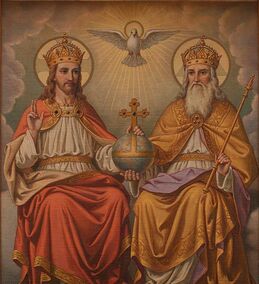
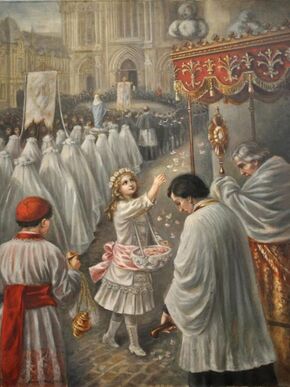
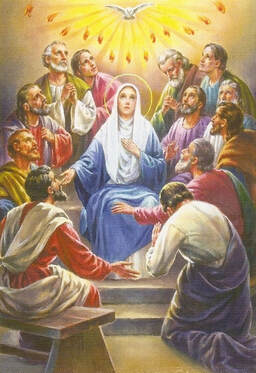
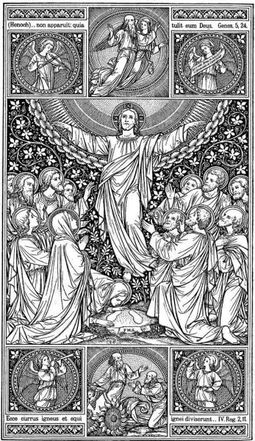



 RSS Feed
RSS Feed